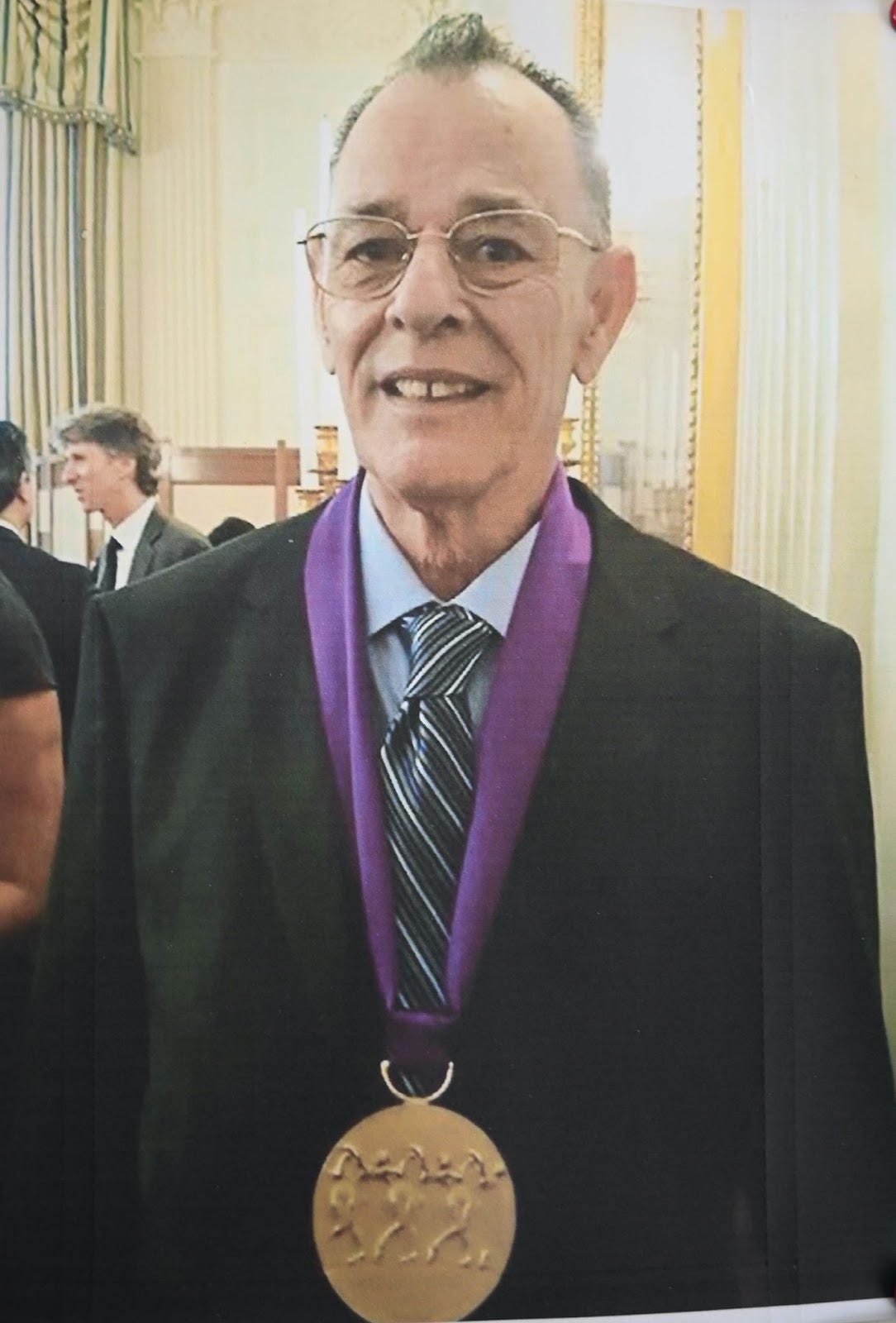Santiago Jimenez, Jr.: A Latino Music Legend
Santiago Jimenez, Jr., one of the brightest Tejano musical stars of his generation, has recorded 85 conjunto CDs and eight LPs, for a total of more than 1000 songs and accordion instrumentals. This year marks his 63rd year as a recording artist. His recording career began in 1958 at age 15 when he and his older brother Flaco Jimenez recorded a LP album which they titled “El Príncipe y el Rey de la Acordeón.'' On that classic album, Santiago played the accordion and Flaco played bajo sexto.
Santiago Jimenez, Jr. in his recording studio: Chief Records. Photo. Ricardo Romo Aug. 2021
Jimenez, Jr., has been inducted into the Tejano Music Awards’ Hall of Fame, the Texas Conjunto Music Hall of Fame, nominated for three Grammy Awards, and recognized with meritorious citations by President Bill Clinton and President Barack Obama.
Santiago and his twin brother Eddie were born to Santiago and Luisa Jimenez, [two of their eight children]. They lived on Pastores Street in a section of “El Barrio de La Piedrera” [Rock Quarry Barrio] just south of Mulberry and St. Mary’s Street. It was one of San Antonio’s most distinctive neighborhoods, a community mainly of cement workers employed by the Portland Cement Company. According to Santiago, Jr. his grandfather Patricio Jimenez and his dad, Don Santiago, worked on the construction of the Japanese Tea Garden, known today as Sunken Gardens in Brackenridge Park.
.
In 1948, Don Santiago Jimenez, Sr. and his family moved to 1519 Saltillo Street in the Westside of San Antonio. The timing of the family relocation turned out ideal. Don Santiago Jimenez found a landscaping and maintenance job with the Good Samaritan Community Services center across the street from his home.
At a young age, Santiago Jr. first heard conjunto music from his father who often played the accordion to his son to lull him to sleep. Don Santiago worked long hours and played every weekend--Friday, Saturday, and Sunday--in different nightclubs, including El Gaucho on El Paso Street, Adame’s Nightclub on Highway 90, and Lerma’s on Zarzamora Street. My uncle Cruz Saenz owned El Gaucho where Santiago Sr. played for ten straight years from the late 1940s to late 1950s. It was there that I first heard Don Santiago Sr play live.
Jimenez, Jr. receiving the National Medal of Arts from President Barack Obama. Collection of Santiago Jimenez, Jr.
Santiago Jr. adored his dad and early on began thinking of following in his footsteps as a musician. Santiago never met his grandfather Patricio Jimenez, also a well-known accordion player, but he honored both his father and his abuelo by mastering the two-row button accordion they both played. His father encouraged him to learn to play, but never devoted time to teaching him to play.
Santiago learned conjunto music by listening to his father play. He explained how he would go to Rangel’s Record store on Commerce street to buy his father’s latest records. Santiago, Jr and his father favored the Hohner accordion, an instrument designed in Germany and introduced to Northern Mexico and the Texas Borderlands in the late 19th century. By playing the two-row button accordion, Santiago Jr. has remained true to the music tradition introduced by his grandfather and father.
Jimenez left school at age 15 to devote himself to his music. As a young musician, he earned very little and thus worked for a time with his father in landscaping jobs. In his twenties, he also worked odd jobs and learned the plumbing trade. The weekends were devoted to playing at Latino celebrations in and around San Antonio, events that included birthdays, weddings, and quinceaneras.
As Santiago and I talked about how he began playing the accordion, he mentioned the excitement of playing the traditional conjunto music of South Texas and Northern Mexico. Santiago is the third generation of the Jimenez family who has played the classic German-made accordion. While Santiago never met his grandfather, who died ten years before he was born, he acknowledge that he always gets emotional when he talks about his father, whom he often referred to as Don Santiago.
Jimenez, Jr. at the White House National Medal of Arts ceremony. Photo collection of Santiago Jimenez.
After an initial recording with Flaco Jimenez in 1958, Santiago had to wait three years before he was given the opportunity to record again. He had been suggesting to Manuel Rangel, owner of Corona Records, to give him a sole recording when Lydia Mendoza arrived in 1961 at Rangel’s recording studio with several new songs. She asked for an accordion player. Rangel hastily invited Santiago to join her in a recording of four songs. Worried that they had not practiced together, Santiago wanted to decline, but was convinced to go forward. The session went well and Santiago returned in future years to Corona studios to record other songs on his own.
In over six hours of conversation and a formal interview, Santiago recounted the stories of some of his favorite songs, his fun moments in performing, and the upcoming release of his LP album, “Still Kicking.” As a conjunto music fan, I was familiar with several of the songs that he played for me on the accordion, such as “Margarita” and “Viva Seguin.” His stories are rich and full of history. His dad, for example, wrote “Viva Seguin” in honor of the town where he frequently performed. Don Santiago also composed the popular song, “Margarita,” a melody written in honor of one of his faithful fans from the Seguin community.
Few events can surpass the two occasions that Santiago was invited to the White House to receive recognition from President Bill Clinton and the Medal of Arts from President Barack Obama. The Presidential citation reads that Santiago Jimenez “has helped spread traditional conjunto music blending the sound and culture of South Texas and Mexico. His lively melodies performed in the two-row accordion have captured audiences from around the world.”
Jimenez, Jr. with LP cover preview of upcoming LP to be released this fall. Co-produced with Shotgun House Records and Chief Records. Collection of Santiago Jimenez, Jr.
Santiago stays busy performing, writing music and producing records. He owns his own recording company, Chief Records. And thanks to Gilbert Reyes, the U.S. representative of the German company, Hohner Accordion, Santiago also represents Hohner.






